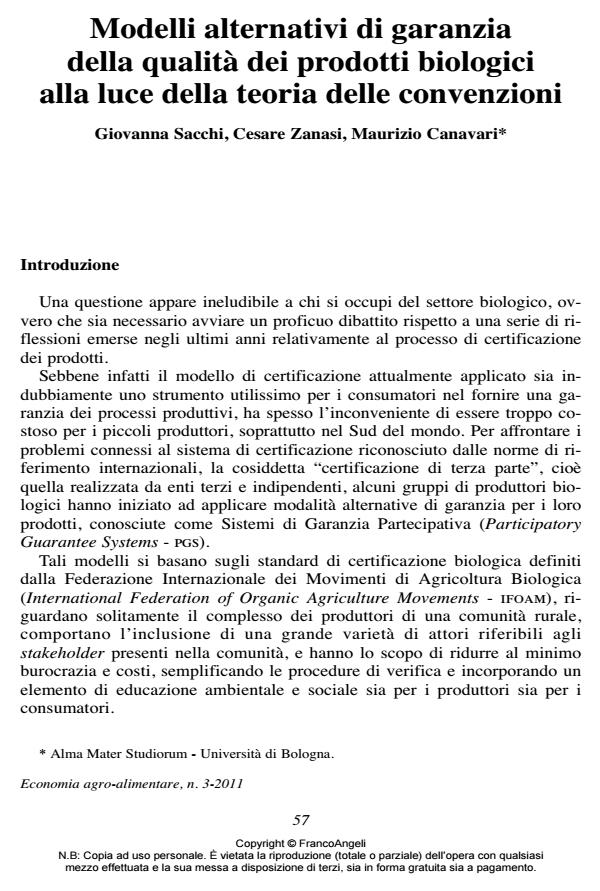Alternative quality assurance models for organic food according to the theory of conventions approach
Journal title ECONOMIA AGRO-ALIMENTARE
Author/s Giovanna Sacchi, Cesare Zanasi, Maurizio Canavari
Publishing Year 2012 Issue 2011/3
Language Italian Pages 24 P. 57-80 File size 533 KB
DOI 10.3280/ECAG2011-003005
DOI is like a bar code for intellectual property: to have more infomation
click here
Below, you can see the article first page
If you want to buy this article in PDF format, you can do it, following the instructions to buy download credits

FrancoAngeli is member of Publishers International Linking Association, Inc (PILA), a not-for-profit association which run the CrossRef service enabling links to and from online scholarly content.
In recent years, parallel to the growth of the organic sector, we have witnessed an increasing interest in alternative ways of guaranteeing the integrity and authenticity of organic food. The mainstream approach to organic certification is useful for consumers in that it provides guarantees regarding production processes and food quality. However, it is less accessible to small-scale producers and poorer consumers, particularly in developing countries. Groups of smallholders and local communities worldwide have started implementing alternative approaches in order to cope with problems associated with third-party certification. These practices are known as Participatory Guarantee Systems (pgs). The Participatory Guarantee is based on International Organic Standards issued by ifoam. It takes place at community level and involves a wide variety of stakeholders along the supply chain (from producers to consumers). It aims to minimize bureaucracy and costs by employing simple verification procedures and incorporating elements of environmental and social education, improving quality for both producers and consumers. Pgs models are based on the idea of voluntary quality assurance and a diffused control approach. Currently, they are mostly used in developing countries and in economies in transition such as Brazil, India, New Zealand, Costa Rica. The adoption of pgs makes organic food affordable even to the poorest consumers mainly through relying upon direct selling and direct trust formation mechanisms. These reduce transaction costs and grant a higher share of added value to farmers. The basic common elements of several pgs projects worldwide are: a participatory approach, a shared vision regarding quality, transparency, trust building and reinforcing mechanisms and a non-hierarchical relationship between the stakeholders. The pgs approach has been observed empirically, however a theoretical framework to interpret this phenomenon has not yet been identified. This framework is necessary to correctly set up empirical research aimed at analysing the factors which determine or hinder its success. The development of participatory guaranteed organic food can be influenced in several ways, depending on the location of the consumers, for example (at a local rural community level or a non-local level) where different levels of trust and social control could influence their behaviour. The aim of this study is to provide a conceptual framework for the analysis of pgs, and aims to contribute to an investigation into consumer attitudes towards organic foodstuffs guaranteed through pgs. The Theory of Conventions has been widely adopted in the study of Geographical Indication products but it has not yet been applied to pgs projects. Pgs and gi products and value creation mechanisms share a broad range of common features, mainly related to the fact that they all deal with credence attributes of high quality foods. The "Theory of Conventions" approach considers that the control of product quality is guaranteed mainly by solid network arrangements. This is achieved by developing close relationships based on trust, thus mainly involving a local dimension and socially relevant mechanisms which go beyond a framework of individual preference analysis. The analytical framework should allow the setting up of an empirical model aimed at measuring the factors influencing the consumption of pgs-certified organic products in different market locations. This allows the identification of a series of variables related to the different conventions which are able to influence consumer behaviour in different market locations.
Keywords: Organic food, quality control, participatory guarantee systems (pgs), theory of conventions
Jel codes: Q010
- L'evoluzione dei Participatory Guarantee Systems per l'agricoltura biologica: esperienze mondiali a confronto Giovanna Sacchi, in ECONOMIA AGRO-ALIMENTARE 2/2015 pp.77
DOI: 10.3280/ECAG2015-002005 - The future of organic certification: potential impacts of the inclusion of Participatory Guarantee Systems in the European organic regulation Giovanna Sacchi, Lavinia Romanello, Maurizio Canavari, in Agricultural and Food Economics 2/2024
DOI: 10.1186/s40100-023-00294-3
Giovanna Sacchi, Cesare Zanasi, Maurizio Canavari, Modelli alternativi di garanzia della qualità dei prodotti biologici alla luce della teoria delle convenzioni in "ECONOMIA AGRO-ALIMENTARE" 3/2011, pp 57-80, DOI: 10.3280/ECAG2011-003005